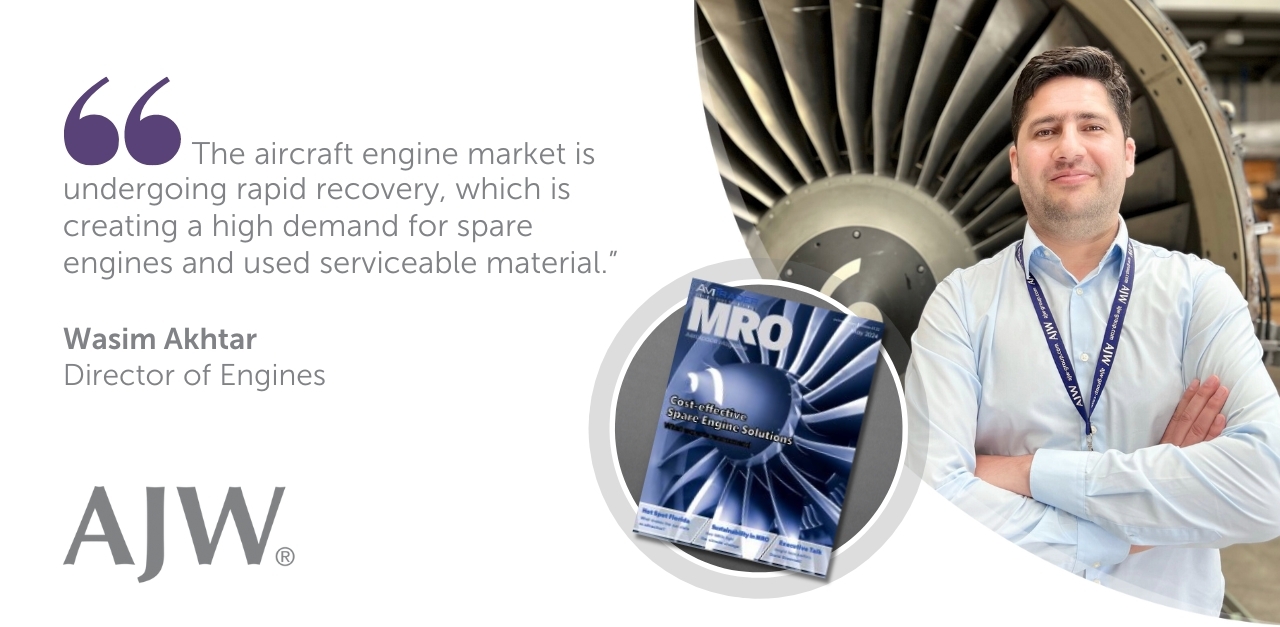

24/7 AOG Critical Response
Hotline![]() UK +44 1403 798888US +1 877 780 2008
UK +44 1403 798888US +1 877 780 2008
Our award winning global AOG service is manned 24 hours a day, 365 days a year.
Please call +44 1403 798888 or email aog@ajw-group.com.

13 Jun 2024

In the post-pandemic period, the commercial aviation sector has recovered more quickly than many had predicted or expected. However, the production of new aircraft and engines has not recovered to the same degree, primarily due to a lack of qualified engineers. Thus carriers, especially those with larger fleets of aircraft, have been forced to alter and adapt previous strategies to keep their aircraft operational – with a key strategy being the utilisation of spare engines.
To investigate the use of spare engines, AviTrader approached experts to discover what cost-effective solutions were on offer. David Dundas speaks to AJW’s Director of Engines, Wasim Akhtar, for his opinion on market challenges.
Dundas begins by asking whether the industry is facing a shortage of spare engines, due to high demand.
Akhtar replies that there is indeed a shortage, "The aircraft engine market is undergoing rapid recovery, which is creating a high demand for spare engines and used serviceable material."
He continues, predicting that, "the current shortage of useable serviceable engines will stay with us for at least the next 18- 24 months, while the OEMs get to grips with their issues on the new-technology engines and associated aircraft."
Next, Dundas tackles the question of how airlines are covering their spare engine requirements to meet their operational and financial needs.
Engine pooling, Power-by-the-Hour agreements, and extending green time through modular replacement remain popular strategies, he concludes, and predictive maintenance allows engines to perform longer on wing. Akhtar cautions that, "Airlines need to look at their future schedules, current fleet, current engine removal plan, and the availability of spare engines already accessible to them and use that information to decide on what inventory is needed."

Speaking about the availability of spare engine solutions, Akhtar points out that "AJW offers a broad range of reliable engine services across a range of engine types, including the leasing and repair of Airbus and Boeing aircraft engines. We are an award-winning independent specialist in the supply and repair of aircraft spare parts and pride ourselves on our customer service and flexibility to support the customers’ needs, helping to reduce their operational costs and improve efficiency."
He discusses smart shop visit planning as another solution to engine shortages and comments,
"Smart shop visit planning and implementing a proactive approach to inventory management are key for any airline if it wants to continue its operations without any engine-driven AOGs, delays, cancellations, or similar issues. It will offer insight into possible repair costs, allowing the airline to proactively search or earmark USM as per their build goals.
If the airline has its own spares, it could proactively invest in upgrading or modifying these to the latest standard requirements to contain the high TAT issues currently being faced at different components MROs. In addition, the airline could liaise with the relevant MROs to lock induction slots and WS discussions."
When asked how airlines can avoid a "zero spare" situation, the AJW Director of Engines has a simple solution to the problem, "An airline could opt to approach a company like AJW who offers bespoke engine management and associated services. We provide several engine leasing options which can guarantee avoiding a "zero-spare" situation for the airline as our vast inventory always ensures spare engine availability."
To conclude, Dundas asks Akhtar the golden question – to exchange or repair an engine?
Akhtar observes that the key thing to look at is where the engine is in its lifecycle, he says investing millions in repairs may lack viability when the engine's remaining lifespan is limited. This is when it becomes pivotal to accurately determine the engine's lifecycle stage when making the choice between repair and replacement.
Exchanging engines instead of repairing older-generation engine types has its advantages. Firstly, it helps avoid costly engine shop visits, saving the operator both time and money. Secondly, the exchange service provides a guaranteed cost advantage compared to traditional repair shop visits. Additionally, airlines benefit from AJWs specific engine data review, ensuring they receive engines with sufficient life and performance to meet operational demands.
Looking for a world-leading engine partner? Contact our engine experts today.